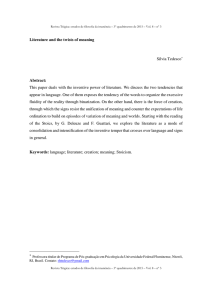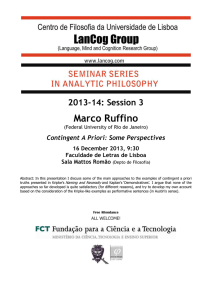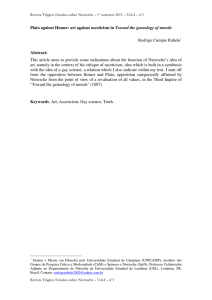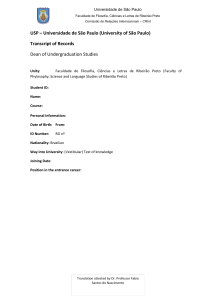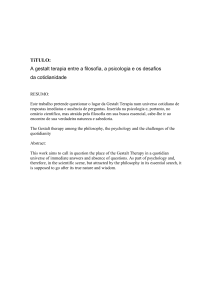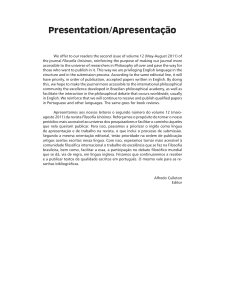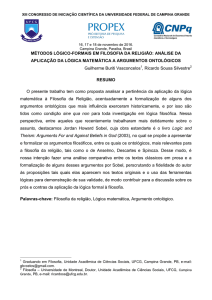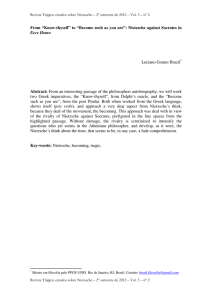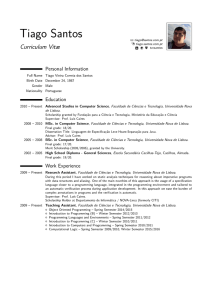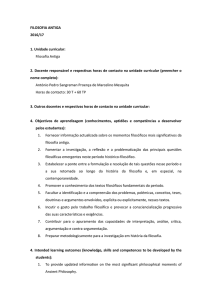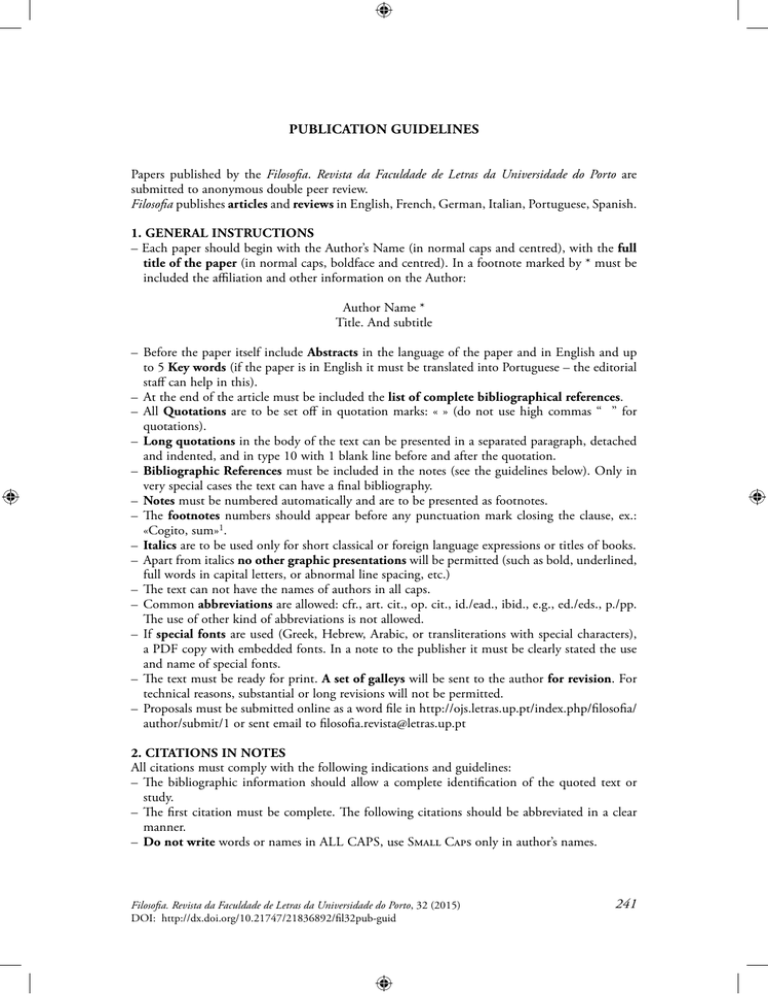
PUBLICATION GUIDELINES
Papers published by the Filosofia. Revista da Faculdade de Letras da Universidade do Porto are
submitted to anonymous double peer review.
Filosofia publishes articles and reviews in English, French, German, Italian, Portuguese, Spanish.
1. GENERAL INSTRUCTIONS
– Each paper should begin with the Author’s Name (in normal caps and centred), with the full
title of the paper (in normal caps, boldface and centred). In a footnote marked by * must be
included the affiliation and other information on the Author:
Author Name *
Title. And subtitle
–Before the paper itself include Abstracts in the language of the paper and in English and up
to 5 Key words (if the paper is in English it must be translated into Portuguese – the editorial
staff can help in this).
–At the end of the article must be included the list of complete bibliographical references.
–All Quotations are to be set off in quotation marks: « » (do not use high commas “ ” for
quotations).
–Long quotations in the body of the text can be presented in a separated paragraph, detached
and indented, and in type 10 with 1 blank line before and after the quotation.
–Bibliographic References must be included in the notes (see the guidelines below). Only in
very special cases the text can have a final bibliography.
–Notes must be numbered automatically and are to be presented as footnotes.
–The footnotes numbers should appear before any punctuation mark closing the clause, ex.:
«Cogito, sum»1.
–Italics are to be used only for short classical or foreign language expressions or titles of books.
–Apart from italics no other graphic presentations will be permitted (such as bold, underlined,
full words in capital letters, or abnormal line spacing, etc.)
–The text can not have the names of authors in all caps.
–Common abbreviations are allowed: cfr., art. cit., op. cit., id./ead., ibid., e.g., ed./eds., p./pp.
The use of other kind of abbreviations is not allowed.
–If special fonts are used (Greek, Hebrew, Arabic, or transliterations with special characters),
a PDF copy with embedded fonts. In a note to the publisher it must be clearly stated the use
and name of special fonts.
–The text must be ready for print. A set of galleys will be sent to the author for revision. For
technical reasons, substantial or long revisions will not be permitted.
–Proposals must be submitted online as a word file in http://ojs.letras.up.pt/index.php/filosofia/
author/submit/1 or sent email to [email protected]
2. CITATIONS IN NOTES
All citations must comply with the following indications and guidelines:
–The bibliographic information should allow a complete identification of the quoted text or
study.
–The first citation must be complete. The following citations should be abbreviated in a clear
manner.
–Do not write words or names in ALL CAPS, use Small Caps only in author’s names.
Filosofia. Revista da Faculdade de Letras da Universidade do Porto, 32 (2015)
DOI: http://dx.doi.org/10.21747/21836892/fil32pub-guid
241
CITATION OF ARTICLES
Initial(s) of the author’s first name(s) with period + Author’s last name in small caps, «Title of
the article in quotation marks», Title of a Journal in italics, volume number (year of publication)
page numbers:
Note: In the first citation the title of the Journal cannot be abbreviated.
Ex. 1: Engel, Pascal, «La volonté de croire et les impératifs da la raison: sur l’éthique de la
croyance», Revista da Faculdade de Letras – Série de Filosofia, série II, 18 (2001) 165-176.
2nd citation: Engel, «La volonté de croire…», art. cit., p. 167.
Ex. 2: Alonso Dacal, G., «La hipótesis de Ortega», Revista de estudios orteguianos, 5 (2002)
103-110.
2nd citation: Alonso Dacal, «La hipótesis de Ortega», art. cit., p. 107.
CITATION OF INDIVIDUAL BOOKS
Initial(s) of the author’s first name(s) with period + Author’s last name in small caps, Title of the
book in italics, (collection: optional) Publisher, place of publication year of publication, page
numbers.
Ex. 1: Coimbra, Leonardo, O criacionismo (síntese filosófica), pref. D. Santos, (Obras de Leonardo Coimbra, 2), Livraria tavares Martins, Porto 1958, p. 170.
2nd citation: Coimbra, O criacionismo, op. cit., pp. 111-115.
Ex. 2: Janik, Allan – Stephen Toulmin, Wittgenstein’s Vienna, Elephant paperbacks, Chicago
1996, p. 196.
2nd citation: Janik – Toulmin, Wittgenstein’s Vienna, op. cit., p. 286, n. 9.
Ex. 3: Courtine, Jean-François, Inventio analogiae. Métaphysique et ontothéologie, (Problèmes et
controverses), Vrin, Paris 2005, p. 191.
2nd citation: Courtine, Inventio analogiae, op. cit., pp. 319-322.
CITATION OF STUDIES IN MISCELLANEOUS WORKS
Initial(s) of the author’s first name(s) with period + Author’s last name in small caps, «Title of
the study, in quotation marks», in Editor’s name (ed.), Complete Title of the Volume in italics,
Publisher, place of publication year of publication, page numbers (collection: optional).
Ex.: Hankinson, R.J., «Philosophy of Science», in J. Barnes (ed.), The Cambridge Companion to
Aristotle, Cambridge University Press, Cambridge 1995, pp. 109-139, cf. p. 127.
2nd citation: Hankinson, «Philosophy of Science», art. cit., p. 125.
CITATION OF CLASSICAL WORKS AND CRITICAL EDITIONS
Author’s name, Title in italics, Editor’s name, Publisher, place of publication year of publication,
page numbers or lines (collection: optional).
(in special cases of easy recognition, an abbreviated form is allowed, cfr. ex. 1 e 2)
Ex. 1: Plato, Rep. 531b; Thomas Aquinas, Sum. Theol. I-II, q. 95, a. 3.
Ex. 2: Aristóteles, Sobre da alma, trad. A.M. Lóio, rev. T. Calvo Martínez, (Obras completes
de Aristóteles) Centro de Filosofia da Universidade de Lisboa – Imprensa Nacional Casa da
Moeda, Lisboa 2010, Liv. II, 5, 417b2-16 (p. 77).
2nd citation: Aristóteles, Sobre da alma, op. cit., Liv. III, 5, 430a10-25 (pp. 116-117).
Ex. 3: Séneca, Lúcio Aneu, Cartas a Lucílio, trad., pref. e notas J.A. Segurado e Campos, Fundação Calouste Gulbenkian, Lisboa 1991, p. 49.
2nd citation: Séneca, Lúcio Aneu, Cartas a Lucílio, ed. cit., p. 362.
CITATIONS OF MANUSCRIPTS
City, Library, Collection, shelf mark, folium/folia.
Ex.: Lisboa, Biblioteca Nacional de Portugal, Alc. 262, f. 149ra.
Note: In the first citation, the name of the Library cannot be abbreviated.
242
Filosofia. Revista da Faculdade de Letras da Universidade do Porto, 32 (2015)

